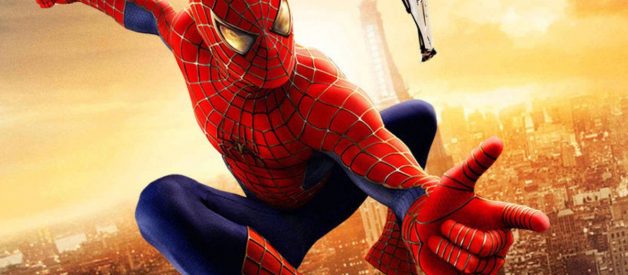
When I was a kid I used to read superhero comic books. I still do as a 56 year old man, from time to time. And every few semesters I teach an entire class of Introduction to Philosophy at City College based on a close study of superheroes understood as the modern equivalent of ancient myths, offering us plenty to think about in terms of ethics, metaphysics, philosophy of mind, and so forth.
One of my favorite superheroes of all time is Spider-Man, aka Peter Parker. He?s a shy, usually penniless, bright young man with a penchant for science. Peter is an orphan, living with his uncle Ben and his aunt May. One day he is bitten by a radioactive spider, and as a result develops spider-like superpowers: a super-strength, super-speed, the ability to climb vertical surfaces, a tingling sense of imminent danger. His abilities as a chemist allow him to augment his newly founded powers with a type of highly flexible and very strong webbing, which he shoots from two wrist devices he has crafted.
Initially, Peter thinks that his powers can be turned into cash, for instance by signing up as a boxer and beating the crap out of guys who appear to be far more strong than he is. One day, however, Peter makes the greatest mistake of his life: he has a chance to stop a robber but does not intervene, thinking that it is none of his business. The escaped robber goes on to kill uncle Ben, and Peter learns his lesson: ?with great power comes great responsibility.? He decides to turn his powers to good use by becoming a masked crime fighter. And the rest, as they say, is (fantastic) history.
The famous phrase about power and responsibility, now widely referred to as the Peter Parker Principle, has a long history stretching from the French revolution to the British parliament. Its exact origin is uncertain, but we find something like it in the Working Plan of the French National Convention in 1793. In part, it says:
?[The Representatives] must contemplate that a great responsibility is the inseparable result of a great power.?
In 1817, William Lamb, a member of the British Parliament, said: ?The possession of great power necessarily implies great responsibility.?
And another well known Brit, Winston Churchill said in 1906: ?Where there is great power there is great responsibility.?
In the case of Spidey, the phrase is actually attributed to uncle Ben. It?s the very last thing Ben says to Peter just before he dies. And it sets the ethical framework for Peter?s evolution as a superhero.
Spider-Man is a reliable moral compass within the Marvel universe, along with other characters like Captain America and the Invisible Woman. In my comic book-reading experience, these three come close to the Stoic ideal of always trying to do the right thing: helping others while treating them fairly and with dignity. In contrast, some superheroes at times engage in actions that are morally questionable, to say the least (Tony Stark/Iron Man and Reed Richards/Mr. Fantastic come to mind).
And speaking of Stoics, Seneca actually wrote about something akin to the Peter Parker Principle in his On Clemency, a fascinating book dedicated to the newly invested emperor Nero:
?Clemency becomes no one more than a king or a prince; for great power is glorious and admirable only when it is beneficent; since to be powerful only for mischief is the power of a pestilence.? (I.3)
As is well known, Seneca has a mixed reputation even among Stoic practitioners, because of his support of Nero?s regime. To be fair, though, Seneca tried to control and steer the young Nero in the right direction. Historians agree that he succeeded for the first five years or so of Nero?s reign, with the help of the Prefect of the Praetorian Guard, Sextus Afranius Burrus. It was only with the death of Burrus in 62 CE, and with the increasing madness of Nero, that Seneca lost control of things and tried to retire (which the emperor would not allow). Seneca was eventually ordered to commit suicide by Nero, because he was thought to be implicated in the Pisonian conspiracy against the emperor (he probably was not a co-conspirator, but he almost surely knew about the plot and did not alert Nero, which was just as bad, from the tyrant?s perspective).
In fact, On Clemency is a thinly veiled series of threats to Nero. While Seneca at times flatters the emperor, he more often than not reminds him of the awful consequences of becoming a tyrant, as it had happened already to one of his recent predecessors, Caligula, whom Seneca excoriates in several of his writings, for instance in De Ira.
Back to Spider-Man and the Peter Parker Principle. Marcus Aurelius was certainly someone with great power, and by all accounts he wielded it very responsibly. He was keenly however, however, that even an emperor can only do so much, which is why he reminded himself:
?Set yourself in motion, if it is in your power, and do not look about you to see if anyone will observe it; nor yet expect Plato?s Republic: but be content if the smallest thing goes on well, and consider such an event to be no small matter.? (Meditations, IX.29)
Don?t wait for Plato?s Republic was a common saying at the time, meaning something along the lines of our don?t wait for Utopia. We need to act here and now, in the best way we can, not wait for perfection. Notice also that Marcus reminds himself not to care about someone else noticing what he is doing: we need to do the right thing because it is the right thing, not because we wish to be praised by others. Spider-Man does this on a regular basis: nobody knows who he really is, so Peter doesn?t get any credit for the web-slinger?s exploits. Even worse, good old J. Jonah Jameson ? the publisher of the Daily Bugle ? constantly berates Spider-Man in print, oblivious to the fact that he is actually employing Spidey as a photographer for his newspaper.
At the end of the above quote, Marcus also says that however small our contribution to society may be, it matters. Spider-Man?s contributions are very large by the standards of ordinary people, but he keeps constantly treading water, defeating one super-villain only to see another one pop up, in the superhero version of whac-a-mole. And yet, Peter keeps going. Because it matters.
While we regular human beings are neither emperors nor superheroes, the Peter Parker Principle still applies, properly scaled. Most of us do have some degree of power. If we are an employer, we have power over our employees; if we are teachers, we have power over our students; if we are higher up in an office hierarchy, we have power over those below us. Even in situations of parity ? with our friends or loved ones, for instance ? we still have the power to affect lives for better or for worse.
It follows that we should all keep the Peter Parker Principle in mind, and act accordingly. Imagine how much better the world would be if we all implemented this simple decision. Now stop imagining, and actually do it.


